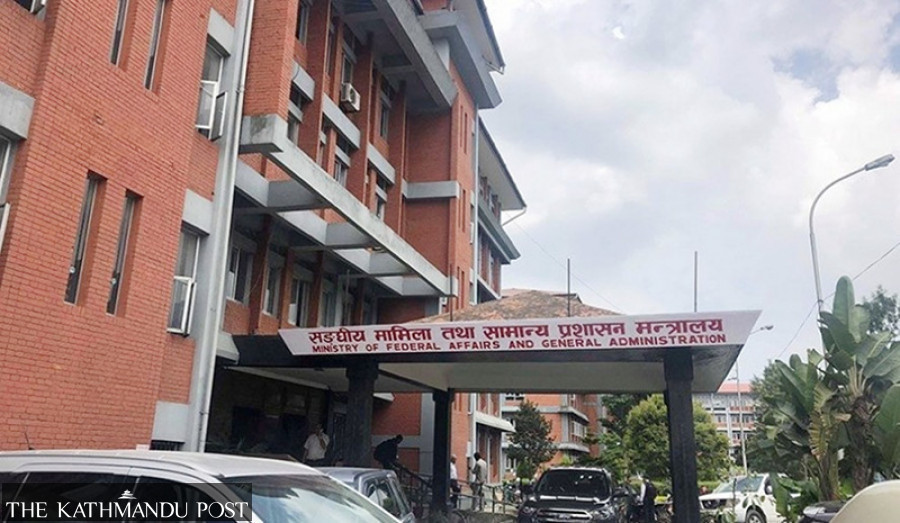National
Government tightens screws on cooperatives to exit FATF grey list
Ministry issues circular to local units seeking details of cooperatives operating in their sphere.
Post Report
Authorities have stepped up regulation of the cooperative sector as part of what they call urgent measures to remove the country from the Financial Action Task Force (FATF) grey list for the second time.
The government has directed all cooperatives to submit their detailed reports under anti-money laundering laws.
It has sought details of cooperatives, citing the context of the FATF and the Asia/Pacific Group on Money Laundering’s grey list.
The Ministry of Federal Affairs and General Administration has written to all local units across the country seeking detailed reports of the cooperatives operating within their areas. The Department of Cooperatives wants the information to monitor the cooperatives based on their risk of mismanagement.
The ministry made the latest correspondence on Thursday at the request of the Ministry of Land Management, Cooperatives and Poverty Alleviation, which had earlier instructed all cooperatives to submit their details via Google Forms by the end of mid-August. The notice has been circulated to all the local governments across the country.
According to the ministry, the Department of Cooperatives, in line with section 7 (2) of the Asset (Money) Laundering Prevention Act, 2008, has sought the annual details for the fiscal year 2024/25 through Google Forms to facilitate the monitoring of risk-prone cooperatives.
Section 7 (2) of the Act states that in case any information has not been supplied to the Financial Information Unit or something different in details or information has been received after the supply of details or information in the course of transaction, the entity, bank, financial institution or non financial institution concerned must report such details to the Unit immediately.
Department of Cooperatives spokesperson Raghunath Mahat said details have been sought collectively through the institutional channel. He added that the information will include quantitative data on low- and high-turnover cooperatives.
“After the Asset (Money) Laundering Prevention Act, 2008 came into force, our department had dispatched the request letter to all the relevant offices to abide by,” Mahat said. “But, after Nepal was put on the grey list of FATF, the government has stepped up the enforcement of the Act so that the country is removed from the list.”
Like banks maintain ‘know your customer’ (KYC) details, the cooperatives also must update their ‘know your member’ (KYM) data. Mahat said that getting a member to fill out this form before depositing money in the cooperative will be mandatory now.
The Money Laundering Prevention Act mentions that any bank, financial institution, or nonfinancial institution must maintain a person’s clear identity while establishing any kind of business relations with him/her or transacting an amount more than the limit in one or several instances as prescribed by the central bank. They have to do it by publishing notices on a regular basis.
Mahat said that since most cooperatives are registered at the provincial level, they urged the Ministry of Federal Affairs and General Administration to correspond in the name of local units.
The chair of the High-Level Economic Reform Recommendation Commission and former finance secretary Rameshore Khanal, who submitted their report to the government in April, also stressed the urgency of regulating the cooperatives sector.
The commission report even mentions an individual depositing Rs900 million without any sources in cooperatives. Therefore, the report suggested 11-point recommendation for regulating cooperatives.
However, Khanal said regulating cooperatives alone will not remove Nepal from the FATF’s grey list.
More than the cooperatives, non-profit organisations are engaged in the act of money laundering, Khanal said. “Though the government has more to do to remove the country from the grey list, regulating the cooperatives is a good start.”
The government’s move comes at a time when thousands of victims have been struggling to recover their money deposited in hundreds of crisis-ridden cooperatives.
Multiple studies including one by the Special Parliamentary Probe Committee have stated that billions of rupees deposited by general people in thousands of cooperatives is at risk. Besides, the cooperatives are blamed for mismanagement and embezzlement of the depositors’ funds.
A meeting of the FATF, held February 17 to 21 in Paris, decided to place Nepal on the grey list after it failed to meet several obligations.
Earlier, Nepal was on the FATF grey list from 2008 to 2014. The country must clean up its financial sector within two years, or it will be placed on the black list and face more international transaction hurdles and sanctions should the country continue to be on the list.
Nepal’s placement on the grey list stems from its failure to fully implement necessary legal and structural reforms to combat money laundering and terrorist financing, despite some legislative progress. The Asia/Pacific Group on Money Laundering (APG), which conducted Nepal’s mutual evaluation, highlighted weaknesses in the enforcement, investigation, and prosecution of financial crimes and inadequate regulation on high-risk sectors like cooperatives and real estate.
Nepal was given until October 2024 to meet FATF standards following an extension in July 2023. However, the international body found that the country had not sufficiently addressed these deficiencies by the deadline, which resulted in Nepal being on the list for the second time.




 11.12°C Kathmandu
11.12°C Kathmandu














